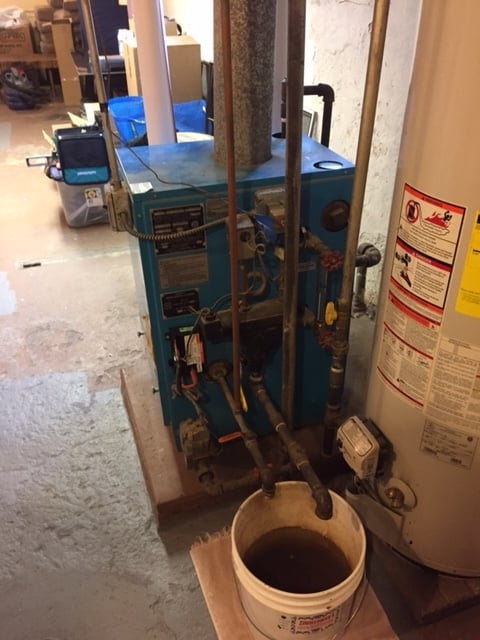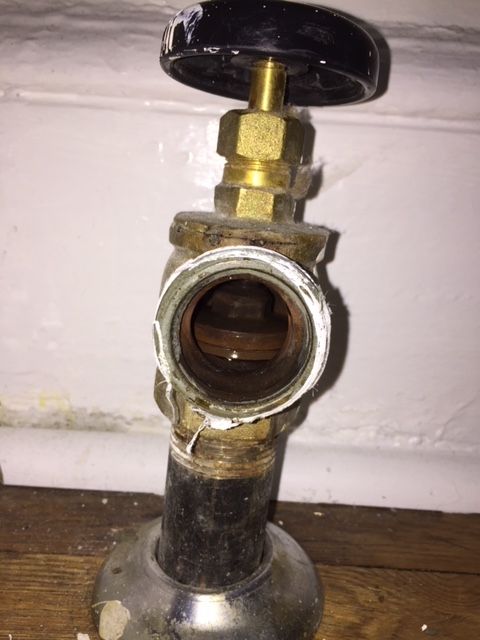Welcome! Here are the website rules, as well as some tips for using this forum.
Need to contact us? Visit https://heatinghelp.com/contact-us/.
Click here to Find a Contractor in your area.
Proper way to slope one steam pipe
nagc
Member Posts: 13
Hello All,
I've recently bought my first house, and am learning all about steam heat (read "We got Steam Heat", insulated all my steam pipes, etc). I have a one-pipe system, and one of the pipes that leads to an upstairs bedroom is banging like crazy. I believe it's the slope in the basement pipe, and I was wondering if anyone had a thought on slightly sloping it the correct way.
My thoughts were to unhook the upstairs radiator, and then place a 2x4 between the joists where the pipe in question runs, and raise it using a jack slightly. Does anyone think that's a bad way to go (i.e. I could break the pipe by applying pressure)? Or is this something I'd need to have a plumber come in and properly fix it using new pipes? It's only a 7' section from the main to where the pipe leads up through the wall.
Thanks.
I've recently bought my first house, and am learning all about steam heat (read "We got Steam Heat", insulated all my steam pipes, etc). I have a one-pipe system, and one of the pipes that leads to an upstairs bedroom is banging like crazy. I believe it's the slope in the basement pipe, and I was wondering if anyone had a thought on slightly sloping it the correct way.
My thoughts were to unhook the upstairs radiator, and then place a 2x4 between the joists where the pipe in question runs, and raise it using a jack slightly. Does anyone think that's a bad way to go (i.e. I could break the pipe by applying pressure)? Or is this something I'd need to have a plumber come in and properly fix it using new pipes? It's only a 7' section from the main to where the pipe leads up through the wall.
Thanks.
0
Comments
-
How badly off is the slope?
i had to ship one of my upstairs radiators to correct a slope issue. I used a 2X4 to lever the radiator up and put a 3/4" strip of plywood under the vent end and a 1/2" strip under the valve end. Use steady pressure and steady the radiator as you lift it, don't force anything.
In my case all I could get was a 3/4" shim before the pipe under the floor hit the bottom of the subfloor. After you get the radiator up you can then support the radiator run down the cellar.
BobSmith G8-3 with EZ Gas @ 90,000 BTU, Single pipe steam
Vaporstat with a 12oz cut-out and 4oz cut-in
3PSI gauge0 -
When I bought the house, there was carpet in all the upstairs rooms, which I removed to expose the hard wood floor beneath. That obviously left a huge gap from the wood floor to the valve, so I shimmed the radiator with oak dowels to compensate the new height difference, and then I sloped it correctly (towards the vent/pipe).
The pipe in the basement that leads from the main seems to be almost level, which is why I'm assuming it's the culprit to the severe banging.0 -
There may be a horizontal pipe between the first floor ceilg and the second floor that you cant see and that may not be sloped right. See how far you can lever that radiator up and see if that helps with the water hammer.
BobSmith G8-3 with EZ Gas @ 90,000 BTU, Single pipe steam
Vaporstat with a 12oz cut-out and 4oz cut-in
3PSI gauge1 -
Good advice, I'll try that first and see if I get any results. Thanks for your input.0
-
Do you know what size pipe it is? What size radiator is it supplying?0
-
That runout in the basement may not be right, either. It does have to really slope back to the main. Check it, if you can, with a long (four foot) level -- the little ones aren't really up to the job. Make sure too that it doesn't have a sag in it. It's surprising how little it takes to make a pipe bang...Br. Jamie, osb
Building superintendent/caretaker, 7200 sq. ft. historic house museum with dependencies in New England0 -
Larry, that particular pipe running from the 2" main is 1.5", and about 7' in length before it goes up the wall, and the radiator is small, 24" high and around 13" long.
I have checked the level in the basement with a 4' level, and it seems fairly level. I do worry about putting too much pressure on it to "raise" it to where it should slope, as it sits just an inch or so below the joists. My thought was a 2x4 under it perpendicular from joist to joist to raise it that one inch so it has a slope.0 -
Fairly level won't do. It must slope. But that inch in seven feet should be quite adequate -- and that much lift isn't going to strain the pipe.Br. Jamie, osb
Building superintendent/caretaker, 7200 sq. ft. historic house museum with dependencies in New England0 -
It seems a lot of the noise seems to be coming right from the radiator itself, or around it, upon listening closely this morning.0
-
I usually tell people to put their hand on the supply pipe under the valve if possible and turn the boiler on, and then tell me if the banging happens before or after they have to take their hand off the pipe. If i'm there in person, i use a thermal camera to try and get an idea of where the steam is when the hammering starts.
Is your inlet valve to the radiator fully open?gwgillplumbingandheating.com
Serving Cleveland's eastern suburbs from Cleveland Heights down to Cuyahoga Falls.1 -
The valve is fully open, but I was wondering if maybe it's the supply valve itself. It seems like there is almost a gurgling sound and tapping going off in the radiator. It's happening mostly in the morning when the heat kicks back on, and is only loud in the bedroom, as in, the banging does not seem to happen in the basement if that matters?0
-
It's possible that the valve may seem to be fully open, but have come apart -- or partly come apart -- inside. You could take it apart -- with the boiler off! -- and see if it is in good repair. But keep in mind that if you take it apart you have to be sure you can get it back together again, as you can't run the boiler with it apart!Br. Jamie, osb
Building superintendent/caretaker, 7200 sq. ft. historic house museum with dependencies in New England0 -
Its very possible it came apart. If you feel up to it, pop the bonnet on the valve and see.gwgillplumbingandheating.com
Serving Cleveland's eastern suburbs from Cleveland Heights down to Cuyahoga Falls.0 -
Thanks to all of you for your advice so far. I'll check that this weekend when I have a spare few and report back! Homeownership... What a blessing.0
-
You could disconnect the radiator at the union, slide it out of the way, tilt it and check for condensate...at the same time look in and see if the supply valve is fully open....Actuate it and look at the same time....for fully opening and closing...Is the vent opening and closing correctly....I used to disconnect the radiator and at the same time run the boiler and listen for gurgling...you may not want to do that,up to you....Can you send a pic of the boiler insulation....just so we can see where it all begins,and ends0
-
Correction boiler installation not insulation,,,0
-




Ok, I attached some pics, and one is the supply valve fully open. I don't know enough about the supply valve to tell if this is how the seal should sit when fully open, or if this is the culprit.
0 -
-
That's either a horribly piped parallel-flow or badly piped counter-flow. I'm doubting it's counterflow since I see what looks like a return on the floor on the left. Or maybe some weird parallelflow/counterflow combo.0
-
Wow, no wonder you hear gurgling. That boiler is really piped wrong. @Abracadabra , it looks like the mains tilt back towards the boiler, at the boiler but it also looks like they tilt away from the boiler a little further out. I would say the problem is the near boiler piping. It really needs to be corrected and the mains pitched properly. I suppose one main could be counter-flow and the other parallel but the near boiler piping still needs to be corrected in order to have dry steam and that bull headed Tee that ties what should be two mains together needs to go. If you have the I&O manual, take a look at the diagrams for installation, in there.0
-
''Tis why pictures tell a big story....Also that valve looks like it's not functiionly correct....0
-
Damn, not what I wanted to hear.
So, I have what I'm assuming is a return pipe at both ends of the main that follow the basement along the floor and return to the boiler which you can see in the last two pics from my post at 12:32. The main slopes on the longest part towards that outer wall (see new picture) and has a vent on the end of it. I searched when I first bought the house for the boiler manual online, but I was unable to find it.
All the heat works good so far except for that banging in the one bedroom, so maybe I'll replace that valve, and then figure out who to call to come and take a professional look at the piping.
0 -
If you fix the localized banging let it rip seeing it's been good otherwise....worry about it in the spring...0
-
Also, not sure what name is on that boiler, but it was made by Dunkirk. These boilers do not tolerate improper piping at all, and yours definitely doesn't look like it follows the manufacturer's diagram- especially if the steam pipe leaving the boiler is any smaller than 2-1/2-inch.All Steamed Up, Inc.
Towson, MD, USA
Steam, Vapor & Hot-Water Heating Specialists
Oil & Gas Burner Service
Consulting0 -
It has the name Crown Jamaica on it.0
-
How old is that boiler?0
-
another horribly piped boiler...like Steamhead said, those boilers dont behave well when piped wrong. Even THEIR minimum standards for piping aint so hot. Its almost like you have to go above and beyond the standard piping to dry out the steam on those ones.gwgillplumbingandheating.com
Serving Cleveland's eastern suburbs from Cleveland Heights down to Cuyahoga Falls.0 -
Just some friendly advice. All the professionals you need to look at your piping are already looking at it in this thread lol
This much I know! I meant someone in person to come and give me a quote here in NY. All of you are awesome with your advice, and taking the time to help explain the issues. Definitely appreciate it. I spent a decent amount of time looking at the pipes after researching online and wondering "are these at all correct??" prior to coming on here. Unfortunately you all let me know they are in fact, not at all correct. Lame! HAHA
0 -
Fortunately you have a lot of knowledge based in NY so you should be in good hands with a pro from here. There's a section above find a contractor where you can contact them
https://heatinghelp.com/find-a-contractor/Peter Owens
SteamIQ0 -
From what I see the piping starts out as counter flow with a drip and then switches to parallel flow at the center support beam.
Had they started out parallel flow with the high point at the boiler then the long main would have dropped below the wood beam and been a head knocker for sure.
The strange piping seems to be above the filing cabinet in the corner.0 -
The counter then parallel provides a longer run when height is limited? How about a sawtooth main?JUGHNE said:From what I see the piping starts out as counter flow with a drip and then switches to parallel flow at the center support beam.
Had they started out parallel flow with the high point at the boiler then the long main would have dropped below the wood beam and been a head knocker for sure.
The strange piping seems to be above the filing cabinet in the corner.
0 -
Jumper, please enlighten me of your version of a sawtooth main.
What I see is a longer run that one would not hit their head on.
WAG on my part of why it was installed that way originally.
Boiler risers and header still need work.
That radiator valve looks small for steam.....maybe they all do now.0 -
I think @jumper was just being funny. That main is all over the place. I'm guessing someone thought they could pitch the portion of the main, nearest the boiler, back towards the boiler and drip it below the water line and then pitch the rest of the main away from the boiler and run the condensate parallel to with the steam flow, into a wet return, and they probably could have gotten away with that had they put a proper Header in, with a proper equalizer. BUT, I suspect the entire main could have been parallel flow had they not raised the main so high on this end of the main. Looks like 4" to maybe 6" of pitch along that main. A couple inches would have been enough and probably allowed enough pitch from the boiler over to that main for it all to flow parallel.0
-
I don't know anyone around that area. Were you able to locate any Steam Pro?0
-

Funny guy, huh? I was anticipating an involved explanation.
I was anticipating an involved explanation.
I think the original dead men purposely did this combination design with the head room in mind. The last installer probably would not have installed the CF drip with the boiler change out.
The picture attached is also on a Dunkirk, with only the single 2 1/2" riser used. Not my install. Some handy welder fashioned this header to pick up the original 3" riser that is connected to about 4' of CF main before it becomes a parallel flow system. Had these 1922 dead men not done this, the 3" express main would have hung below the center support beam where the basement stairway comes down and been a real head knocker.
The concentric "welder tee" must hold water, but there is no water hammer on start up, (no CF drip installed). This system runs on about 8 ounces of pressure, has orifices on each rad supply valve, had no traps, is quiet and pretty fast to heat. The return condensate comes back cool to luke warm. It seldom cycles on the vaporstat.
Just an example of a not so good near boiler piping job that works well. I don't think "fixing" this NBP pictured would justify the cost. IMO0 -
It's always justified @jughne, always
 0
0 -
I understand that correcting this NBP would improve the system.
However, this used to be almost non heating, no air venting at all, water hammer and about $600 NG a month.
Now heats quick and quiet. NG almost half of previous bills.
It would be a hard sell.....don't fix what isn't broken.....
Don't change things that may not show ROI or increased longevity of system or improved comfort for HO. IMO
Change out of this boiler.....o yea.....double risers, drop header, correct equalizer, but leave the first 4' CF as is.0
Categories
- All Categories
- 86.5K THE MAIN WALL
- 3.1K A-C, Heat Pumps & Refrigeration
- 54 Biomass
- 423 Carbon Monoxide Awareness
- 96 Chimneys & Flues
- 2K Domestic Hot Water
- 5.5K Gas Heating
- 101 Geothermal
- 157 Indoor-Air Quality
- 3.5K Oil Heating
- 64 Pipe Deterioration
- 929 Plumbing
- 6.2K Radiant Heating
- 384 Solar
- 15.2K Strictly Steam
- 3.3K Thermostats and Controls
- 54 Water Quality
- 42 Industry Classes
- 48 Job Opportunities
- 17 Recall Announcements




